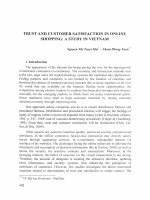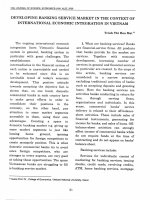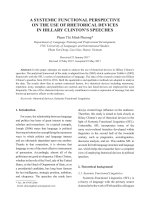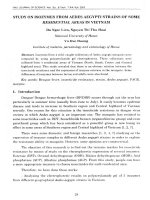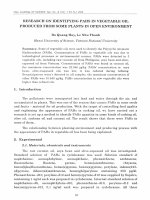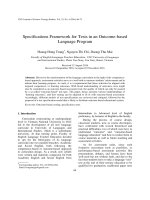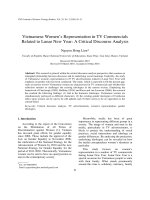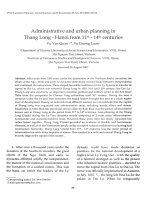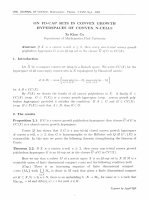DSpace at VNU: Developing banking service market in the context of international economic integration in Vietnam
Bạn đang xem bản rút gọn của tài liệu. Xem và tải ngay bản đầy đủ của tài liệu tại đây (2.74 MB, 6 trang )
VNU.JOURNAL OF SCIENCE, ECONOMICS-LAW, Nq2E. 20Q6
DEVELOPING BANKING SERVICE MARKET IN THE CONTEXT OF
INTERNATIONAL ECONOMIC INTEGRATION IN VIETNAM
T rin h T hi Hoa M ai(,)
The ongoing international economic
integration faces V ietnam ’s financial
system in general, banking system in
particular w ith great challenges. The
establishm ent
of
financial
interm ediaries in the financial system of
each nation is unavoidable and needed
to be welcomed since this is an
inevitable trend of today’s economic
development. This positive attitude
towards accepting the objective fact is
shown th at, on one hand, domestic
commercial banks in each country have
to make great efforts in order to
consolidate their positions in the
economy, on the other hand, pay
attention to some m arket segments
accessible to them , using their own
advantages.
C reating a space in
domestic banking m arket e.g. giving up
some m arket segm ents is ju st like
loosing
home
ground,
opening
opportunities for foreign competitors to
create monopoly position. This is what
domestic commercial banks try to avoid
since foreign competitors, who are
stronger in every aspects, are very good
a t taking those opportunities; The space
Vietnamese banks are struggling to fill
is banking service m arket.
1.
W hat are banking services? Banks
are financial-service firms. All products
th a t banks provide for the m arket are
services.
Together
with
economic
development, increasing number of
services in general and financial services
in particular are created. In the scope of
this article, banking services are
considered in a narrow meaning,
excluding traditional activities of banks
such as accepting deposits and granting
loans. Here the banking services are
activities banks conducting in return for
fees,
through
serving
firms,
organizations and individuals. In this
sense,
commercial
banks’ service
delivery is related to their off-balancesheet activities. These include sales of
financial instrum ents, generating fee
income for banks; and sales of loans. Offbalance-sheet activities can strongly
affect income of commercial banks while
do not require funds at the time of
contracting and do not appear on banks’
balance sheet.
Banking services include:
Services for individuals: consist of
m arketing for banking services; issuing
checks, credit cards, revolving credits,
ATM, home banking services, mortgage
11 Assoc.Prof. Dr., College of Economics, Vietnam National University Hanoi
21
I
22
loans, investm ent m anagem ent services,
tax services etc.
Services for business firms: comprise
of financial guarantees; money transfers;
investm ent, insurance, accounting, and
advisory services etc.
Services for international trade:
services for business firms involving in
international
trade,
including
international
paym ent
services,
financing etc.
These services have the following
characteristics:
Firstly, they do not require banks’
funds. This is a great advantage for
Vietnamese commercial banks, whose
capital is low. Therefore, along with
m easures to increase domestic banks’
equity such as equalization of stateowned commercial banks, mergers and
dissolution some weak joint-stock banks
etc.., banks should also consider
developing various types of services as
an im portant measure.
Trinh Thi Hoa Mai
F inally, banking services require an
adequate infrastructure. Commercial
banks cannot provide services for
consumers as well as business firm with
poor infrastructure. Beside th at, a
competent staff force th a t not only has
firm theoretical background but also is
professionally proficient is a special
requirem ent of banking service delivery.
2.
In current context of Vietnam,
developing banking service m arket is
necessary and feasible, due to the
following reasons:
F irst, the economy’s demand
banking services is increasing.
of
Secondly, off-balance-sheet services
are a potential source of high profit for
banks since their costs are usually low.
They are considered an efficient line of
business which modern banks around
the world actively engage in.
For an underdeveloped economy,
individuals and firms do not have much
demand for services, especially banking
and
financial
services.
However,
together with more and more open
economy, increasingly liberalized trade
and financial system, demand for
financial services would increase rapidly
and cannot be met by domestic financial
interm ediaries. There would be a very
good opportunity for foreign financial
institutions in dom inating domestic
financial m arkets when m arket entry
barriers are lowered in accordance with
integration commitments.
Thirdly, off-balance-sheet services
are regarded as a low-risk field of
business.
Hence,
expanding these
services will help banks reduce risks
such as interest rate risk and especially,
credit
risk
due
to
asymmetric
information in financial m arkets.
In reality, the dem and for financial
services, especially in urban areas, is
increasing. This dem and associates with
the rapid pace of setting up new firms of
various ownership as well as equitizing
state-owned enterprises. It is the
demand for trading stocks, investm ent
VNU, Journal o f Science, Economics-Law, N „2E, 2006
Developing banking service market in the context
advisory services, leasing, liability
m anagem ent etc. The establishm ent of
foreign-invested
companies in the
economy is a catalyst, promoting the
dem and for financial services. They are
non-cash
paym ent
services, ATM,
foreign exchange services etc. Obviously,
the demand for financial services would
encourage
the
establishm ent
and
development of the supply of services,
which are still in short. Therefore,
banking service m arket in Vietnam is of
great potential, ready for accepting new
supply sources. This is also a m arket
space th a t Vietnam ese commercial
banks should actively exploit.
Second, Vietnam ese banks’ situation
calls for developing th e service market.
In fact, most commercial banks have
not yet focused on accessing the service
m arket. Traditional activities such as
lending are still m ain sources of
revenues (for most banks, revenue from
lending account for more than 70% of
total revenues. The reason here is th at
Vietnamese banks are weak in many
aspects while, in order to be able to
provide new and m odern services, banks
have to invest more on modern
technology and equipm ent, improve
staffs skills etc. (Bank for Foreign Trade
has invested more th a n 30 million USD
on technology). These are difficulties
th a t would take banks quite a long
period of time to overcome.
However, it is undeniable th a t since
weaknesses at credit managem ent
VNU, Journal o f Science, Econom ics-Law, N J E , 2006
23
confront banks with serious risks,
affecting
their
profitability
and
efficiency, developing services is a
reasonable trend. From m any countries’
experience, small scale banks can still
build their own advantages in some
m arket segments. For Vietnamese
commercial banks, in addition to
traditional services, establishing new
image and position by developing new
services is necessary. New services such
as card payment, ATM, paym ent for real
property’s purchase, money transfers,
salary paym ent and m anagem ent for big
companies etc. would help banks
increase business efficiency, reduce
risks, thanks to diversification of
business lines and investm ent portfolio
of individual bank. Therefore, accession
to modern banking service m arket in the
context of weak commercial banks could
be an effective m easure to restructure
banking activities, reduce risk exposure
and non-performing loans, contributing
to the cleaning of banks’ balance sheet.
Hence,
current
situation
of
Vietnam ese commercial banks itself
poses an urgent need of expanding and
developing the banking service market.
This objective need do not arise from
ability of banks to supply services for the
m arket but from the weaknesses of them
when
international
integration
is
approaching.
Developing
service
activities has become one of the effective
solutions for commercial banks to
overcome current difficulties, and
welcome the fresh b ut severe winds of
integration.
24
It is necessary to affirm th a t many
bank services are new to Vietnamese
commercial banks b ut they would be
able to successfully deliver a t least some
of the numerous types of services.
Moreover, some banks have already
developed many new services. For
example, Bank for Foreign Trade has
developed various modern services such
as VCB online, VCB money including
Home Banking and Ebanking, credit
card services, ATM, debit cards “VCB
connect-24”, VCB Cyber Bill Payment,
VCB Global Trade, VCB T reasure etc.
Legal framework for banking services
has also been improved.
Trinh Thi Hoa Mai
significantly to the satisfaction of the
demand for funds and foreign exchange
payment, promoting export, im port as
well as attracting overseas national
foreign exchange, fostering economic
growth.
2.
Brave
and
determined
in
developing new but high potential
services. There are many types of
services such as services to collect
information and forecast; advisory
services; security issuing guarantees etc.
As above analyzed, the m arket of these
services have good prospects. Beside
these, Vietnamese banks should consider
providing services th a t are new to them
but surely be offered by foreign banks
3.
The next issue is th at, in the
when they access Vietnamese market,
context of a weak banking system, how
for example, sales of loans. Banks can
can banks feasibly and efficiently develop
earn profits by selling their loans at
the service m arket? In our view, the
price higher than the principal. The
following m easures could be applied in
buyer earns an interest rate lower than
order to develop banking service market:
the loan's initial interest rate. This
For
cred it
in stitu tio n s
as
service generates significant income for
serv ice su p p liers
commercial banks. Other services are
services
for
banks’
1.
Active
but
selective
and specialized
customers.
For
example,
foreign
concentrative in developing services.
exchange trading on behalf of customers;
F irst of all, focus on services banks
servicing
a
mortgage
loan-backed
currently offer such as issuing checks,
security by collecting principal and
credit cards, ATM, money transfers,
interest and passing all the proceeds to
salary payment services, accounting
the security's holder; guaranteeing debt
services, foreign exchange services etc.
securities by issuing drafts accepted by
Banks should improve the quality of
banks; providing credit guarantee by
these services in order to preserve their
issuing standby letter of credit under
share in domestic m arket. It is possible
which banks pledge to provide customer
to say th a t foreign exchange services in
with a pre-determ ined am ount of credit
big cities like Hanoi, Ho Chi Minh city
or guarantee for the issuance of
have met the dem and of firms and
commercial papers and other securities
individuals.
They
contribute
VNU, Journal o f Science, EconomicS-Law, N ^ E , 2006
Developing banking service market in the co n tex t.
etc. Vietnam ese commercial banks
should not simply seek for m arket but
more im portantly, control and dominate
the domestic m arket. In order to do that,
the urgent task each individual bank
has to fulfill is to increase financial
capacity and develop hum an resource.
3. Active in creating alliance and
coordination between credit institutions
in developing services. In reality, in an
open economy, related services can
strongly affect and support each other.
Coordinative alliance between credit
institutions in offering modern services
help them not only reduce initial
investm ent but also increase the
possibility of dom inating the service
m arket by domestic banking system as a
whole. By so doing, V ietnam ese financial
interm ediaries can strengthen
their
competitiveness in competition
with
foreign ones in domestic m arket. The
establishm ent
of interbank
ATM
network is a good example for the
strength of coordination, which should
be multiplied for other banking services.
4. Create an appropriate mix of
traditional and modern services based
on current advantages of each bank. In
fact, the lack of modern services makes
providing traditional services more
difficult and inefficient. Services such as
advisory and analysis services, exchange
rate insurance services, services to
hedge against exchange rate risks,
foreign exchange services etc. have a
close relationship
with traditional
services.
VNU, Journal o f Science, Econom ics-Law, N J E , 2006
25
5.
Have a plan for hum an resource
development in banking industry. Have
more active role in training, for example
by coordinating with high quality human
resource suppliers. In the long-term,
adm it specialization in hum an resource
educating
and
training,
separate
commercial banks' business activities
from hum an resource training. New
training as well as re-training for
banking industry should be done by
educational institutions in educating
system. This is consistent with the trend
of attaching educational institutions to
labor users.
The su p p o rtin g
go v ern m en t
role
of
th e
Beside the efforts of each bank, the
supporting role of the government is
very im portant.
1. Government's supporting role is
shown by a comprehensive and complete
system of policies and legal documents,
expressing the respect for banks’
independence, self-control, and freedom
to conduct business in a high competitive
and level playing field. Sound and stable
business environm ent would help banks
grow more steadily and access rapidly to
domestic financial markets.
2. The government also has an
im portant role in regulating financial
service
m arket.
Interdependence
between
services
as
well
as
independence of entities participating in
banking service m arket requires unified
regulation and command. Therefore,
together with completing the legal
Trinh Thi Hoa Mai
26
transactions with the participation of
many entities in the economy. Banking
services then become a necessary
demand and integral p a rt of money
m arket transaction. Similarly, the
development of stock m arket will create
increasing demand for banking services
such as guarantees, investm ent advisory
3.
Develop
financial
m arkets
services, portfolio m anagem ent services
including money m arket and capital
etc.
m arket, which should be considered the
4.
Have a plan to support credit
key
measure
to encourage
the
institutions by improving intellectual
establishm ent and development of
standards of the people in order to create
domestic financial service market.
the demand for banking service.
Developed
money m arket
creates
However, government cannot change
conditions fpr commercial banks to
people’s old habits or help them access
execute their strengths in supply
modern services by only propaganda or
checking accounts and making payments
coercive
adm inistrative
measures.
for customers. In the context of
Business firms and individuals would
developed money m arket, short-term
use non-cash paym ent services, money
financial claims are traded frequently
transfer services, advisory services etc.
among entities, increasing the value of
once they realize the benefits of these
transactions. This sets forth conditions
services,
e.g.
quickness,
accuracy,
for banks to realize their relative
safeness and convenience. However,
strengths compared to other entities. By
advertisem ent, instructions, information
using
banking
services,
entities
provision would change people’s attitude
participating in money m arket save time
more rapidly. Essentially, these are
and money; and have lower risks than
banks’ sound m arketing activities before
using cash. The more money m arket
providing a new service.
develops, the wider the scope of
framework, governm ent’s supervision
and
inspection
should
also
be
strengthened. P unishm ent sanctions
should be strict and transparent,
creating a sound playing field, ensuring
business rights of credit institutions, and
protecting benefits of banks’ customers.
REFERENCES
3.
F. Mishkin, Money, Banking and financial markets, Science and Technology Publisher.
Hanoi 1994.
Edward w. Reed and Edward K. Gill, Commercial banks,Hochiminh City Publishing
House.
Peter Rose, Commercial bank management, Finance Publisher,
Hanoi 2001.
4.
Banking reviews, 2003-2005.
5.
Vietnam security reviews, Vol. 1+2, 2005.
1.
2.
VNU, Journal o f Science, Econom ics-Law, No2E. 2006

